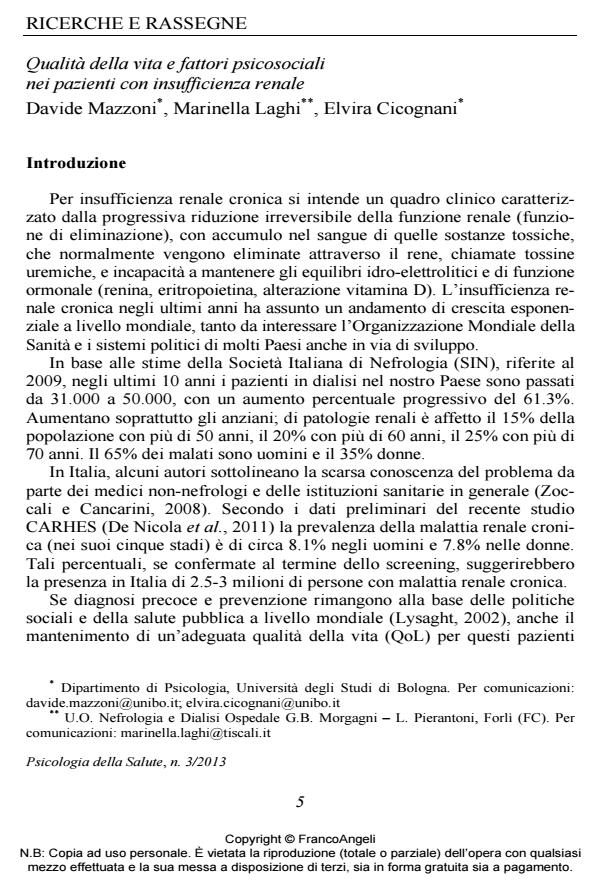Quality of life and psychosocial factors in patients with renal insufficiency
Journal title PSICOLOGIA DELLA SALUTE
Author/s Davide Mazzoni, Marinella Laghi, Elvira Cicognani
Publishing Year 2013 Issue 2013/3
Language Italian Pages 23 P. 5-27 File size 426 KB
DOI 10.3280/PDS2013-003001
DOI is like a bar code for intellectual property: to have more infomation
click here
Below, you can see the article first page
If you want to buy this article in PDF format, you can do it, following the instructions to buy download credits

FrancoAngeli is member of Publishers International Linking Association, Inc (PILA), a not-for-profit association which run the CrossRef service enabling links to and from online scholarly content.
Kidney disease and related treatments can affect patients’ daily activities; however, their impact on quality of life (QoL) and the role played by psychosocial factors are not completely clear. The first aim of this study was to evaluate QoL (measured by the WHOQOL-Brief) and psychological well-being of patients with chronic renal failure and differences according to some socio-demographic variables (gender, age), and type of treatment (hemodialysis, peritoneal dialysis, post-transplantation). Secondly, among patients in dialysis, we wanted to verify the impact of some psychosocial variables, such as illness representations, coping strategies and perceived support from the social network, on QoL and psychological well-being. The sample includes 104 patients in dialysis (hemodialysis and peritoneal) and 34 who had received kidney transplantation. Patients in dialysis show lower QoL than posttransplantation patients in several QoL domains, while differences between type of dialysis (hemodialysis and peritoneal) are not statistically significant. Results indicate that among patients in dialysis, the perception of renal disease as more controllable, the adoption of active coping strategies and a perception of a large supportive social network can improve QoL. The study has strong implications for clinical practice and prevention.
Keywords: Quality of life, dialysis, illness representations, coping, social support, kidney transplantation.
- Health Literacy Emanuela Saita, Susanna Zanini, Enrico Minetti, Chiara Acquati, pp.306 (ISBN:9781522519287)
- Transformative Healthcare Practice through Patient Engagement Emanuela Saita, Susanna Zanini, Enrico Minetti, Chiara Acquati, pp.1 (ISBN:9781522506638)
- COPE-NVI-25: validazione italiana della versione ridotta della Coping Orientation to the Problems Experienced (COPE-NVI) Luca Caricati, Chiara Foà, Laura Fruggeri, Annalisa Tonarelli, in PSICOLOGIA DELLA SALUTE 2/2015 pp.123
DOI: 10.3280/PDS2015-002007
Davide Mazzoni, Marinella Laghi, Elvira Cicognani, Qualità della vita e fattori psicosociali nei pazienti con insufficienza renale in "PSICOLOGIA DELLA SALUTE" 3/2013, pp 5-27, DOI: 10.3280/PDS2013-003001